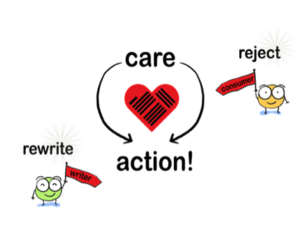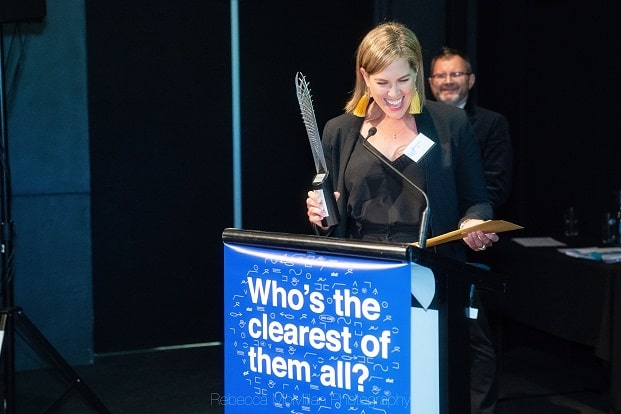Read on for part 2 of the inspiring speech given by Lynda Harris, Awards founder and CE of main sponsor Write Limited, at the 2018 Plain English Awards
I said that care can be a powerful catalyst for action if we will act on what we feel prompted to do. The three law firm owners I interviewed had done just that — they literally turned their values and sense of care into strong action.
So, believing what you do about the power of plain language, my question to you as both writer and consumer is ‘what action can you take that is bigger and bolder than before?’ How can you make your sense of care count?
As a writer your awareness of the benefits of plain language will naturally spur you on to rewrite. Make your effort meaningful! What significant project needs your support and insights? Which of your reader groups are most in need? Who must you persuade? Where can you make a difference?
As a consumer, it’s your voice that will bring change, so speak up! When you receive a document that is anything but reader-friendly, reject! Don‘t sign a difficult to understand contract. Query unclear instructions and ask for better. Tell companies what you think of their convoluted policies.
Let care equal action. Let care equal clear.

Find out more about the WriteMark Plain Language Standard
Melissa Wardell February 14th, 2019
Posted In: 2018 Plain English Awards, Industry awards, Social good
Tags: 2018 Plain English Awards, Care, clear communication, Social good

Taking care costs nothing and means everything. Image by Ross Findon. Unsplash licence
Read on for part 1 of the inspiring speech given by Lynda Harris, Awards founder and CE of main sponsor Write Limited, at the 2018 Plain English Awards
Good evening! Let me start with a question: Why are you here? What prompted you to enter the annual Plain English Awards? What brought you along tonight?
I’m pretty sure that you’re here because you care. You care about the cause. You care about the ideal of plain language because you understand the cost, in both financial and human terms, of poorly conceived and written communications. You care about wasted effort, wasted time, and wasted money.
And you care about the enormous disadvantage that poor writing can bring, especially when the communications are about access to justice, or help of some kind, or are connected with legal, financial, or health services.
It was the very same notion of care that prompted us, 13 years ago, to set up these Awards.
It was because they cared that our foundation sponsors, Consumer, TechCommNZ, and Graphic Solutions came on board, as did our other wonderful sponsors who followed.
And it was also that notion of care that led us to establish the WriteMark Plain Language Standard, now cleverly rebranded by Craig Christensen to reflect that central idea of — you got it — care.

The thought I’d like to leave you with tonight is that, rather than thinking of care as simply an emotion connected with plain language, let’s recognise that care has tremendous value in its own right. Care can be a powerful catalyst for action if we follow through on what we feel prompted to do.
I came to this conclusion after preparing for a presentation at Clarity2018 in Montreal recently. The conference was attended by over 500 delegates from around the world, most of them lawyers. In my presentation I explored the idea that having a set of strong, people-based values baked into the firm’s mission might lead naturally to clearer, more accessible law.
I interviewed several B Corp law firms in Australia and Canada. B Corps are accredited organisations that believe business can be a force for good in the world.
What struck me was that in each conversation the people I interviewed used the word care — a lot. They also used another word: ‘believe’. As they spoke about what they believed in, their values, and precisely what they care about, became clear.
Here’s what three of those firms said.
Alexandra Doig from Atticus values care in communication
I loved my interview with Alexandra Doig, Managing Partner of Atticus Lawyers in Melbourne, Australia. With strong convictions about human rights, Alexandra chose to get B Corp accreditation several years ago. Her core philosophy, ‘We believe in treating people as they would want to be treated’, shone through our entire conversation.
It’s not often you hear a lawyer say, ‘We want everyone to feel comfortable all of the time. We know clients are already stressed with the issue. We aim to reduce that stress and make them feel happier … create a safe space … feel that we are their cheerleaders.’
I asked Alexandra the all-important question: Does your chief value of ‘care’ influence the way you write to your clients? The answer: ‘Yes. Telling people what they need to know, and doing all we can to help, means we need to write like a human. We need to communicate clearly and personally in ways that don’t alienate. We can’t give a client a convoluted document. We have to walk the talk and act on what we believe in.
‘We could write a ten-page document. We try to write a one-pager that clearly captures the most important info, and that the client can easily understand and be comfortable with. It’s a calculated risk — with benefits.
‘We want to write in a way that gives clients that lightbulb moment. If a client doesn’t walk away with a greater understanding of their position than they had when they arrived, we haven’t done our job properly.’
Bravo, Alexandra!
Joel Cranshaw from Clearpoint. believes in simple legal services
Joel’s strapline on his website says it all: ‘Legal services — reimagined simply.’ With a background as an experienced corporate lawyer, Joel said he’d always loved solving client problems. But as time went on, he felt less and less comfortable in a system based on chargeable units. ‘I felt there was no incentive to be efficient, and this often led to friction between client and lawyer.’
Prompted by strong values that focused on serving the client in the best way possible, Joel conceived Clearpoint’s unusual model, where they work on retainer for small to medium-sized firms in Melbourne and beyond. Achieving B Corp status was a natural fit.
Joel is a straight talker: ‘We want to work with compassionate people who value what we do and whose approach aligns with the concept of conscious capitalism. We don’t work with clients who don’t have our values.’
When asked if his values-based approach created clearer law, Joel’s answer was unequivocal: ‘Yes! I say that for two reasons. Our retainer-based fee model means that we must work efficiently — so we must be clear, concise, and to the point. And what we believe in, our philosophical approach to compassionately meeting clients’ needs, also means that we must communicate in ways they can readily understand.’
Applause once more from me!
Sophie Tremblay from Novalex runs a purpose-driven business
Sophie’s was a bold start-up story — similar to the Suspended Coffee movement (buy a coffee, pay for two — those who can’t afford to pay get coffee for free). Sophie and her business partner Ryan Hillier set up Novalex to have a self-sufficient business model, serving both corporate clients and others who need legal help. Neither an exclusively for-profit business, nor an exclusively philanthropic organisation, Novalex is a purpose-driven enterprise doing business for good. For every fee-paying hour, they give a pro-bono hour to eligible start-ups, non-profits, or individuals.
In Sophie’s words, ‘We believe everyone should have access to justice and top-notch legal advice. We hope that corporate clients will see using Novalex as a socially responsible choice. And we hope to give back in any way we can.’
Does this values-based model create clearer law? Sophie: ‘Absolutely! We know that even the smartest people aren’t necessarily familiar with legal terms and concepts. So a huge part of what we do is to make the law understandable. We use concrete examples and remove the abstract, along with many other techniques such as metaphor (“It’s like…”), and “This means…” We remove jargon and make important concepts stand out. We do what we need to do to be understood.’
Care intuitively leads to plain language
Hearing this long list of useful and well-founded plain language techniques, I asked Sophie if she had ever had any formal plain language training. She hadn’t. Nor had Alexandra or Joel. Yet instinctively, motivated by strong human values and a sense of care, all three ticked so many plain language boxes.
My hypothesis was looking good — all three firms proving that care really can be a shortcut to plain language. Admittedly my sample size was only three, but these inspiring leaders and others like them are truly showing the way to clearer law using an approach based on care.
Find out more about each of the three firms here:
Atticus
Clearpoint.
Novalex
Find out more about the WriteMark Plain Language Standard
Melissa Wardell February 12th, 2019
Posted In: 2018 Plain English Awards, Communications, Social good, Sponsors
Tags: 2018 Plain English Awards, Care, plain language, Social good

'We worked for 3 years to get this!' Winner of the Best Plain English Document — Private sector Jacqueline Taylor celebrates her success. Photo by Rebecca McMillan Photography.
What an amazing ceremony last night! Congratulations to all our 2018 winners — you deserved all the recognition you got. The feedback you each received from your judges truly shows that plain English is alive and kicking in New Zealand. It also shows that, as a Trust, we’re making great strides towards fulfilling our goals.
‘Keep going and spread the word!’
A special mention to the winners of our Plain English Champion — Best Individual or Team category. The work that’s gone into the Better Letters Project at the Ministry of Social Development is seriously changing the lives of everyday New Zealanders.
Our judges got it right when they said, ‘Keep going and spread the word! Imagine what New Zealand’s public service might look like if every government department took this approach!’
Find out about this year’s winners
Take a look at photographer Rebecca McMillan’s wonderful photos of the ceremony
Melissa Wardell November 16th, 2018
Posted In: 2018 awards ceremony, 2018 winners, Finalists, Social good, Winners
Tags: 2018 Plain English Awards, 2018 Winners, Champion, clear communication, People's Choice

It's time to celebrate this year's winners! Image by Adi Goldstein on Unsplash
Tickets are available now for this year’s Plain English Awards ceremony
Where? City Gallery Wellington
When? Thursday, 15 November
Come along and celebrate at this year’s ceremony. Join finalists, judges, sponsors, and other supporters for an evening of fun, festivity, and above all celebration.
Wellington Mayor Justin Lester will give an opening address at 5.30pm. And lawyer and comedian James Elliott will be our MC for the evening. Financial advisor, wealth coach, and author Martin Hawes will also return as a guest speaker.
You’ll have a chance to mix and mingle, with drinks and canapés, following the official segment of the ceremony.
Get your tickets now!
Melissa Wardell October 25th, 2018
Posted In: 2018 awards ceremony, 2018 Plain English Awards, Finalists, Winners
Tags: 2018 finalists, 2018 Plain English Awards, Celebration, Industry awards, winners

They're the sparkle on the plain English cupcake. Well done to this year's finalists. Photo by Audrey Fretz on Unsplash
Our judges have announced this year’s finalists. Find out who they are here
What makes an entry good enough to become a finalist? According to our judges, it’s all about being like this:
- ‘Overall, we have a strong example of how a company can take complex information and share the details both with clarity and with compelling storytelling. Kudos!’
- ‘I would certainly use this product as an example of effective plain writing and information design.’
- ‘This is an exemplary document.’
Now the countdown begins to our Awards ceremony on Thursday, 15 November, where we’ll announce and celebrate this year’s winners. Watch this space for details about how to get tickets.
Melissa Wardell October 18th, 2018
Posted In: 2018 Plain English Awards, Finalists, Plain English Awards
Tags: 2018 finalists, 2018 Plain English Awards, Industry awards, People's Choice

Deciding on our shortlists was no mean feat. Photo by Cathryn Lavery on Unsplash.
From what we’ve heard from our judges, finalising this year’s shortlists has been no mean feat. We received many outstanding entries from across both the public and private sectors. We’re thrilled to announce which of those entries made our shortlists.
Take a look at our 2018 shortlists
We’ll make our next big announcement — this year’s finalists — some time around 19 October. Watch this space!
Melissa Wardell September 20th, 2018
Posted In: 2018 Plain English Awards, Judges, Shortlists
Tags: 2018 Plain English Awards, 2018 shortlists, clear communication, Industry awards

We'll let our 'shortlist' cats out of the basket tomorrow, Thursday, 20 September. Image by Eric Han. Unsplash licence.
Over the past 2 weeks our judges have been busy reviewing all of this year’s entries. We’ll let the first ‘shortlist’ cats out of the bag (or basket) tomorrow, so watch this space.
In the meantime we can let you in on some of the feedback we’ve had about this year’s entries. Here’s what one judge told us:
I’m pleased to report we have many excellent entries (quality lifts every year, which is fabulous) and it’s tricky coming up with a shortlist.
Melissa Wardell September 19th, 2018
Posted In: 2018 Plain English Awards, Plain English Awards, Shortlists
Tags: 2018 Plain English Awards, 2018 shortlists, Champion

We were lucky enough to have five judges make last year's Awards ceremony. From left are Simon Hertnon, Kylie McGrath, Rachael Fogarty, Rachel McApline, and Maryland Spencer. Image by A Beautiful Photo
Meet our incredible line-up of plain English experts — from around New Zealand and the world — who’ll be judging entries in this year’s Awards. We’re proud to have such a wonderful pool of experts, and honoured that they’ve all offered their time to help us decide on our finalists and winners. We’re also grateful for the feedback they’ll give to all shortlisted entrants.
Judges for the 2018 Plain English Awards
Melissa Wardell September 3rd, 2018
Posted In: 2018 Plain English Awards, Communications, Judges, People's Choice awards, Plain English Awards
Tags: 2018 Plain English Awards, champions, clear communication, People's Choice, Plain English Awards

You now have 3 whole days more to submit your entries!
Entries for the 2018 Plain English Awards now close at midnight next Monday, 3 September. That means you’ve got 3 extra days to create your winning entry!
Read about our categories
See who won at last year’s Awards
Melissa Wardell August 30th, 2018
Posted In: 2018 Plain English Awards, Industry awards, People's Choice awards, Winners
Tags: 2018 Plain English Awards, clear communication, entry, Industry awards

Put your compelling annual report into the limelight
Have you joined the wave of change? Does your annual report tick off all the statutory stipulations and hum with life? Does it tell a compelling story of what matters to you and your stakeholders? Is it clear and concise?
If you’re twitching with pride right now, jump up and give your report the razzle dazzle it deserves.
Enter this year’s Plain English Awards and your report can leap into the limelight and take a bow. Entries close at midnight on Monday, 3 September 2018.
Fabulous feedback is waiting in the wings
Imagine you and your report basking in this kind of feedback. Here’s what the judges had to say about last year’s winners:
Overall, this is a great example of how you can appease regulatory requirements and appeal to a general reader — a true plain English experience with the audience in mind. Well done!
Great use of visual storytelling and pared-down messaging. The colours are vibrant and engaging.
This report has very little jargon, which is always great to see. The vocabulary is straightforward and clear.
More than just compliance
Gone are the days of an impenetrable collection of numbers and words, prepared for compliance purposes. Shareholders and stakeholders have switched their attention to companies with timely and relevant information shared in a compelling way.
Is this you? If it is, enter this year’s awards today — you need the fabulous feedback, and the world needs excellent examples.
Here’s what winners Z Energy said last year:
We knew making the report highly readable would help readers connect with what Z has achieved and its vision for the future.
A winning report is clear, easy to read, timely, and relevant
Judges will focus on the body of the report and will be checking that:
- all readers (not just the financial wizards) will find it easy to read and use
- readers can use the report to make useful decisions and comparisons.
What makes a clear annual report?
If your report has these elements, the judges will give it the thumbs up.
- Main messages that are clear and obvious
- Clear, concise and jargon free
- Technical terms explained
- Figures presented in an easy-to-understand format
- Graphs, tables and photos that support main messages.
Enter your report for the 2018 Plain English Awards.
Meet last year’s winners
General Account August 29th, 2018
Posted In: 2018 Plain English Awards
Tags: 2018 Plain English Awards, annual report, benchmark, plain English, recognition, stakeholders













